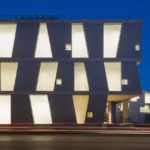Corporate support is important to arts and culture
Access to the arts can play a major role in a city’s quality of life, its tourism efforts and its overall cultural and economic health. Because most organizations that offer that access -- through art museums, symphony orchestras, ballet companies and others -- are typically non-profit, they must rely heavily on the support and collaboration of patrons and corporate donors who share their vision.

The unveiling last year of the new Glassell School of Art with the BBVA Compass Roof Garden and The Brown Foundation, Inc. Plaza, the Museum of Fine Arts Houston’s (MFAH) newest addition to its Susan and Fayez S. Sarofim Campus, was one such effort. Its grand opening was as much a defining moment for the city of Houston as it was for the crown jewel in its cultural tiara, the MFAH.
The redesigned campus - a project first announced in 2015 - was meant to draw visitors and locals alike with an “urban oasis” in the heart of the city. Estimates at the time indicated the renovation would generate nearly $334 million in economic activity over 20 years, with more than $2.5 million in direct, indirect, and induced city tax revenues. Quite a boon for Houston, but with a price tag of $450 million, it was a hefty cost for the non-profit institution. Enter the museum’s capital and endowment campaign.

Night view of the Museum of Fine Arts, Houston's Glassell School of Art. The bank’s $8 million contribution to the visual arts school is its largest charitable donation to date. - Photo by Richard Barnes
The campaign had already netted $363.7 million at the time of the Campus’ announcement, making the effort possible. Private and corporate donors stepped up to the plate, with BBVA Compass leading corporate support with an $8 million donation from its Foundation, saying, “There is a reason we made this donation to the Glassell School at the Museum of Fine Arts, Houston, and it has as much to do with the Museum’s commitment to bringing the power of the arts to young people than anything else. This is a cosmopolitan city that must nurture the creativity of its next generation so it can push even further into the future.”

BBVA Group CEO Onur Genç stands at the top of the BBVA Compass Roof Garden at the Museum of Fine Art, Houston's new Glassell School of Art. "We believe it’s incumbent upon all of us to help people find ways to connect, independent of political or social lines, so that we keep our cities – in this case Houston – moving forward. Art, and the appreciation for it, does that," said Genç.
BBVA Compass isn’t alone in its support of local arts and culture in the communities it serves. According to Business Contributions to the Arts: 2018 Edition, only 8 percent of the companies surveyed do not contribute to the arts at all, which means of course that 92% contribute. Museum of Fine Arts, Houston Director Gary Tinterow says its important to support arts and culture in the communities corporations serve.
According to the MFAH, the completion of The Brown Foundation, Inc. Plaza and the Glassell School of Art helps create a new public greenspace for Houston. The L-shaped Glassell School of Art includes a sloping roofline that can be walked up to the BBVA Compass Roof Garden at the top of the building. The BBVA Compass Garden is named in honor of the bank, which was the leading corporate donor of the campaign. - Video by MFAH
Tinterow: I believe that when corporations support arts and culture, they are demonstrating a commitment to the quality of life in that community...
“I believe that when corporations support arts and culture, they are demonstrating a commitment to the quality of life in that community, recognizing that quality of life if not the most important factor, is at least the second most important factor that will indicate a community or metro region’s success in attracting talent,” he said. “This is important in a day when people are connected intercontinentally in an instant and where talented and educated people can choose where in the world they want to work. The quality of life of a particular community becomes absolutely central to the viability of that community moving forward.”
Tinterow also believes that nurturing the arts and culture scene in a city has an immediate benefit for local businesses.
“Just as companies like BBVA Compass are constantly recruiting new employees, we are similarly doing so - the overall context of Houston is critical to anyone making a decision to move here,” he said. “We’re so fortunate to have fantastic music and visual arts and wonderful outdoor spaces and sports teams. All of these together make up the look, feel and vibe of a city and all need corporate support to help them continue to grow.”
Additionally, there is broad agreement that exposure to art - inside or outside the four walls of a corporation - helps foster creativity and innovation, a tangible benefit to corporation’s bottom line.
In Houston, and in cities just like it across the country, non-profit organizations depend on the support of corporate donors who recognize that an investment in the arts and culture is a critical part of a vibrant city, as well as its businesses and citizens.
Header photo by © Richard Barnes